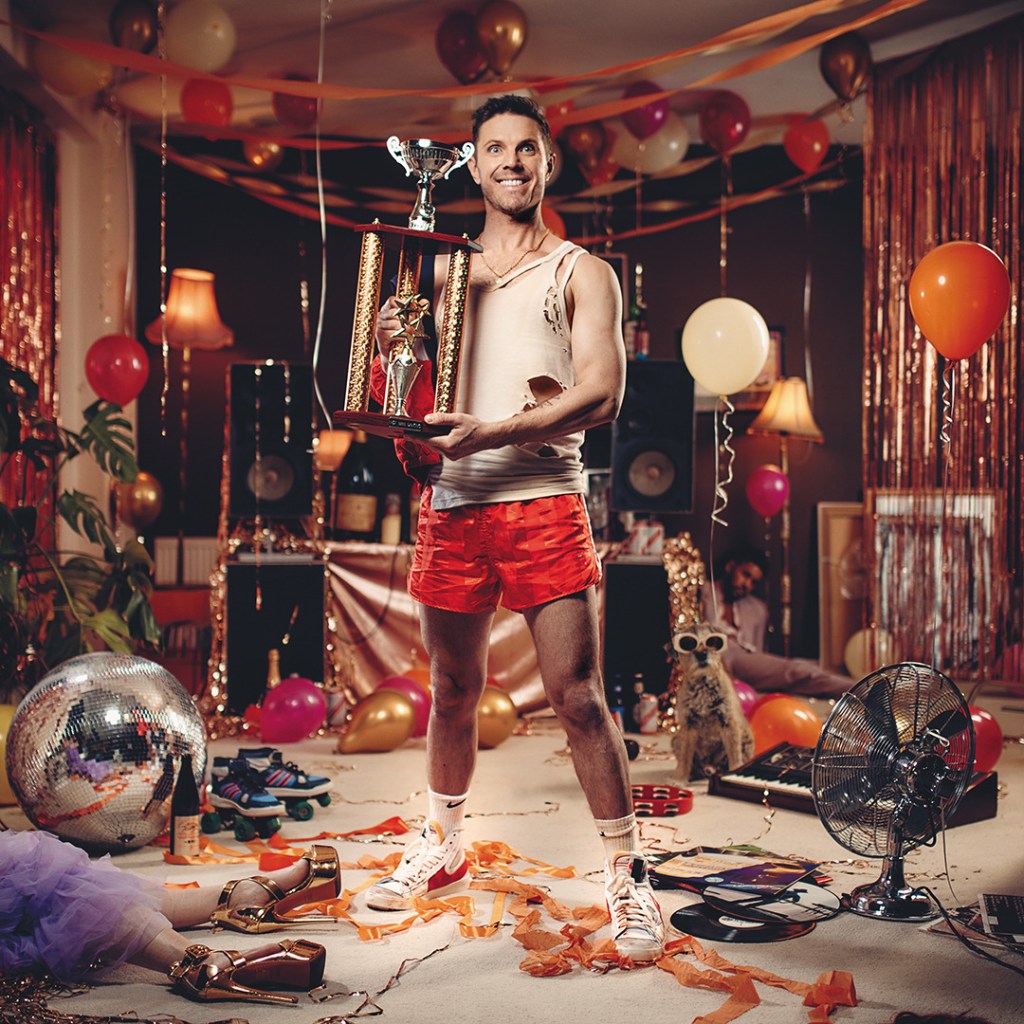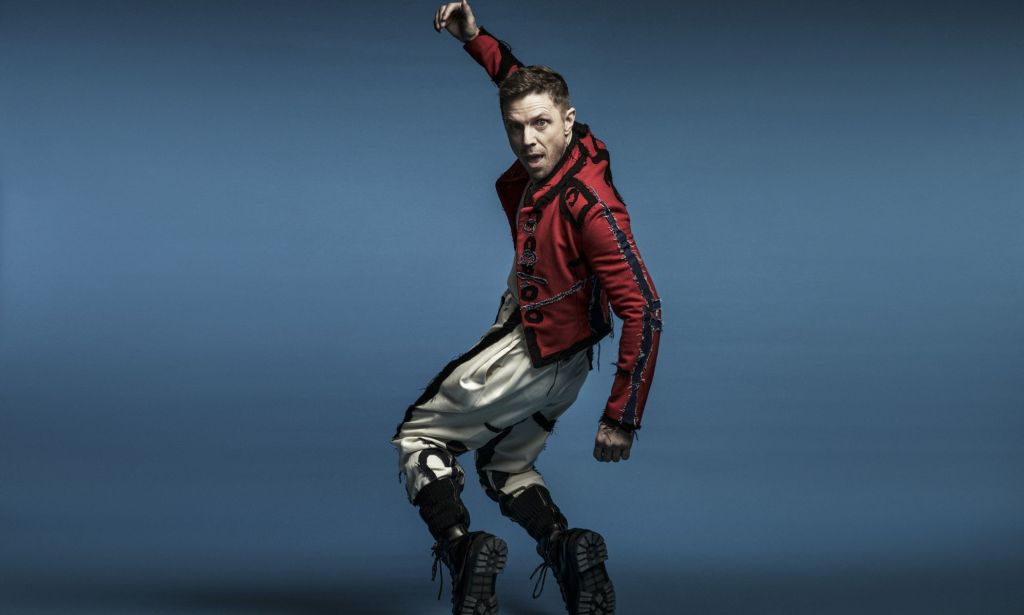Jake Shears on Kylie, manic parties and why he ‘doesn’t care’ about making queer music

Jake Shears’ new album Last Man Dancing is a big queer dance party. (Damon Baker)
Scissor Sisters star Jake Shears tells PinkNews about how Kylie Minogue shaped his new album, wild house parties and why being a queer musician isn’t “as much fun these days”.
There are two things that started the party that would become Jake Shears’ second solo album, Last Man Dancing: Kylie Minogue and Halloween 2021.
After working together on her 2004 single “I Believe in You” and 2010’s Aphrodite, Kylie and Shears planned a reunion for 2018 with trancey single “Voices”, although “there was nowhere for it to go” at the time, Shears says.
“I was making a southern, Honky-tonk record (his eponymous debut album), she’d been doing Golden. So there wasn’t really a space for it,” he explains.
The collaboration found its place on Last Man Dancing, and Shears “started building around it. That was the impetus”.
Then there was Halloween 2021, when New Orleans, where Shears lived before relocating to London in 2022, was “coming alive again” after the devastation of Hurricane Ida a few months earlier.
“It took the city down. My house didn’t have power for a couple of weeks,” he recalls.
After the pieces had been picked up, Shears threw a party that “went off the rails in the best way”.
He recalls: “It peaked at five in the morning. There were hundreds of people in my house and it was mayhem.”

Last Man Dancing, sounds exactly like those early hours of a house party, when everyone’s at least a few shots in, drinks are getting spilled and everyone’s on their feet. It’s disco with flecks of pop.
“’80s Prince s**t,”, and a string of acid house and tech towards the end, as the party stretches into the after-party. “It’s the most me record I’ve made,” Shears says.
The Arizona-born singer found fame in the early 2000s as the frontman of New York pop-and-glam-rock band Scissor Sisters. With hits including “Laura” and “Take Your Mama”, the group had the 10th best-selling album of the 2000s in the UK.
Beyond the music, they blazed a trail for the many queer artists to come after them. Their songs, chocked full of innuendo and tongue-in-cheek humour and pulled together by Shears’ dazzling falsetto, explored coming out and celebrated ballroom culture. With a band named after a lesbian sex act, Scissor Sisters were never going to be anything other than queer change-makers.
“I don’t think or care about infusing queerness into my music. I think it’s just automatically going to be there,” Shears says now.
There are certainly themes of queer celebration on the new album. “Calling all women and calling all men, and the people in the middle, stand up and bend,” he sings on “Do The Television”, while the second half of the record feels like the sun setting on a Pride party.
“I want people to make their own amazing, queer memories of this record,” he adds. “I don’t need to tell them to do it.”
It’s the same story for the music he made with the band. Coming up in NYC, they didn’t need to be intentional about their queerness, it was an integral part of the environment around them. “It was great that we were ourselves and out and proud. I didn’t necessarily know if that was going to translate in a way that it did,” Shears reveals.
As such an explicitly queer band though, and two decades ago at that, there must have been some problems, no?
“There were little bumps here and there… We did get some hate mail occasionally. That’s the key word: it was mail. If there was a backlash or people hated us or whatever, you’d have to be a newspaper columnist to write about it.”
It’s a wild thought: 20 years ago, Scissor Sisters scored one of their biggest hits with (“Filthy/Gorgeous”), a song about trans sex-workers, and an uncensored music video to match, to relatively mild fanfare. Today, Sam Smith opens their mouth and Good Morning Britain breaks into programming, while Twitter trolls pounce.
“I feel for queer artists with massive platforms right now and all they have to face,” Shears says, sounding genuinely mournful. “I don’t think I would ever want to be in that position again, in the world we’re in now. It would suck. Everybody’s got a bullhorn. It’s horrific. It’s just not as much fun these days.”

Queer musicians aren’t alone in having a difficult time. The trans people and drag performers that Shears spent his time around in the US are enduring an onslaught of anti-LGBTQ+ bills which attempt to restrict their access to public life.
Last month, organisers in Port St Lucie, Florida, cancelled their Pride parade because of presidential hopeful Ron DeSantis and his recent drag ban.
Shears is incredulous at the attacks, taking a moment to compose his thoughts.
“It’s mind-blowing,” he says. “It’s going to take some work and time to unravel. I trust in love and goodness and feel like we’ll push through, but there’s a lot of stuff going on.
“A Pride parade with no drag queens is like a basketball game with no balls.”
He recalls a moment, a few years ago, walking out of his apartment when he still lived in the US. “I looked up the street and there’s somebody with a hairy chest and a big hairdo, wearing [a] negligee, [who] just rode by on a unicycle down my neighbourhood street. It made me so happy.”
Thankfully, Last Man Dancing has created a place for the queerdos to hang until the early hours. As well as ultimate LGBTQ+ ally Kylie, the record features queer music greats, including queen of bounce Big Freedia and Amber Martin.
The titular track is a tribute to sticky floors trampled with confetti, which feels apt as Pride Month begins. On “Really Big Deal”, that wink-wink, nudge-nudge humour that was so present during his Scissor Sisters’ career, particularly on 2010’s Night Work, makes a welcome comeback. “I’ll make you feel like you’ve seen God, but I just call it ‘my face’,” Shears coos.
“Something that’s so important, that I don’t want people to lose, is play and humour. The part about me, and my music, that I love, that’s always been there, is humour. It can feel like the world is going to sh*t, but I don’t believe in letting our humour go to sh*t, too.”
Last Man Dancing is out now.

